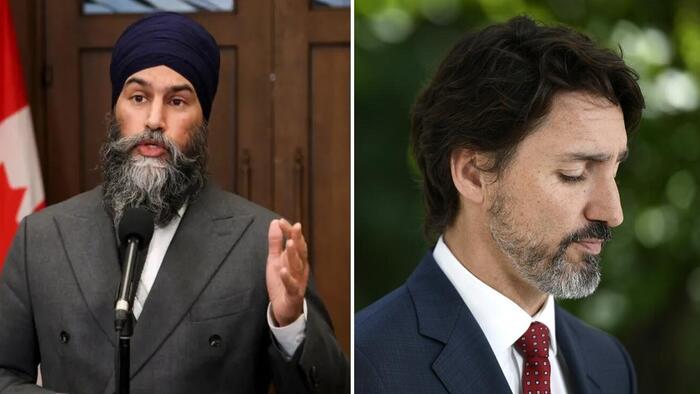In a potentially climactic chapter of Canadian politics, New Democratic Party (NDP) leader Jagmeet Singh has introduced a no-confidence motion against Prime Minister Justin Trudeau’s government, setting the stage for a dramatic showdown in the House of Commons when it reconvenes from winter recess on January 27. Singh’s announcement comes amidst significant turmoil within the Liberal Party, ignited by recent internal fractures and the unexpected resignation of Chrystia Freeland, Trudeau’s long-serving Finance Minister. Singh stated his intent clearly: “We will put forward a clear motion of non-confidence,” indicating that the move could lead to a significant political upset in Canada. The atmosphere in Ottawa is charged, with opposition parties keenly aware of the growing dissatisfaction among the electorate.
The political landscape has been notably destabilized since Freeland’s resignation, which sources claim was due to deep-seated disagreements over policy and leadership style. Trudeau’s communication with Freeland regarding her removal was reportedly abrupt and handled poorly, leaving her feeling demoted and frustrated. Her departure has raised questions about Trudeau’s capacity to lead and has exposed vulnerabilities within his cabinet. This uncertainty reflects a broader sentiment in Canada, where many citizens are grappling with severe economic challenges, including soaring costs of living and housing crises that have persisted for months. Delays and struggles in addressing these issues have only compounded feelings of discontent among voters.
Adding to the drama, Conservative leader Pierre Poilievre has called for an “urgent” reconvening of Parliament to facilitate an early no-confidence vote, signaling intense party rivalries. The opposition appears united in its belief that the Liberal government is out of touch and unable to address pressing concerns, which Singh emphasized in a blistering letter to Trudeau. This growing coalition of dissent underlines a foundational shift in political alliances, as the NDP moves away from its previous support of the minority Liberal government, thereby reshaping the dynamics of the House of Commons profoundly.
The political tensions in Ottawa are exacerbated by external economic pressures, particularly tensions related to U.S. tariffs introduced during the Trump administration. As these challenges mount, anxiety within the Canadian electorate is palpable, and the notion of an early election looms large. Political experts suggest that the Liberals may face serious repercussions at the polls, with current surveys indicating widespread voter fatigue with Trudeau’s party. The prospect of losing power has heightened the urgency for the government to respond effectively to these crises, or risk igniting calls for accountability from both the opposition and the public.
Singh’s motion reflects not merely a routine procedural move but stands as a significant statement against what he perceives as a government beholden to corporate interests and internal squabbles rather than the needs of its citizens. As the NDP seeks to leverage its newfound position, the implications for the political landscape in Canada could be substantial. If voters sense that their concerns are being ignored, they may lend support to opposing parties, altering the future of governance in Canada and redefining political allegiances in the current parliamentary framework.
As the January 27 date approaches, all eyes will be on Ottawa as tensions escalate in anticipation of the no-confidence vote. The interplay between discontent, political maneuvering, and economic realities is likely to set the stage for a pivotal moment in Canadian politics. Analysts and citizens alike will be watching closely as this drama unfolds, with significant potential consequences for Trudeau’s administration and the future direction of Canadian governance. The political theater surrounding the no-confidence motion captures the essence of a government at a crossroads, faced with the challenge of regaining public trust while navigating a tumultuous political environment.

